This Land Is Your Land?
Restoring our right to access Utah’s rivers and streams...
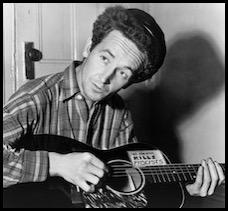
Was a great high wall there, that tried to stop me,
Was a great big sign there says “private property”,
But on the back side, it didn’t say nothin’,
This land was made for you and me.
- Woody Guthrie
I just received word of a rally this coming Friday in Salt Lake concerning the public's right to access Utah's waterways, an issue I've been following for the last few years…
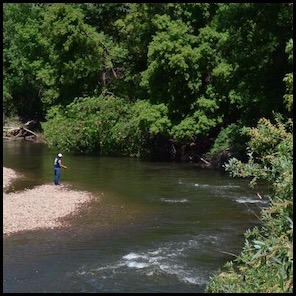
I've often wondered why we allow our politicians to attach ambiguous titles to bills with the intent of clouding it’s actual purpose. This act should have probably been titled the "Public Waters Non-Access Act" as it closed off access to over 400 of Utah's waterways.
There is a long standing tradition in this country that our waterways are considered public property and, as such, our right to access and use these waterways for recreational purposes are protected. There is also an implied "public easement" right to travel these public waterways, even on foot. This public easement is under attack in the State of Utah where we may lose the right to canoe, fish, tube, hunt, and engage in other river based recreation where "wading" or "porting" is necessary.
Here's a little background information on this bill:
In 2000 a Utah couple, Kevin and Jodi Conatser, were cited for trespassing while wading the Weber River on a section that passed through privately held land. It should be noted that the Conatsers accessed this section of the river by raft and DID NOT leave the river bed while wading. They appealed this trespassing citation all the way up to the Utah Supreme Court where their right to access (including walking the river bed) was upheld. For more information, access the timeline on the Utah Stream Access Coalition website.)
In 2010, Utah representative Kay Mciff (Richfield) composed a bill (HB 141) that effectively negated the Supreme Court ruling by creating a new law prohibiting the public from wading rivers while recreating in areas where waterways passed through privately held lands. While drafting this bill, Mciff apparently ignored the fact that these access rights had been upheld by previous court decisions and that private lands were already protected by existing trespass laws; recreational users are prohibited from crossing the high river mark which is considered the point where "public property" ends and "private property" begins. Even though it was apparent that this bill might not stand up to a constitutional court challenge, the Utah Legislature passed it anyway (no surprise there).
At the time that this legislation was proposed, the Ogden Standard Examiner ran a well researched editorial on the issues surrounding HB 141, and in particular the question of easement: Legislative Rhetoric And The Demise Of The Right To Recreate On Public Waters

Compromise language has been proposed to amend (replace?) the law to make it pass constitutional muster and still protect the rights of both property owners and the public. Representative Dixon M. Pitcher is apparently introducing a new "Public Waters Access Act" similar to a law in Idaho that has been in effect for over thirty five years; a law that protects the land owner AND the public right to access public waters. This would be the simplest and, in my opinion, the best solution. A recent article from the Salt Lake Tribune does a good job of covering this “compromise bill”: Bill: Reopen Streams To Public
There are also two pending court challenges contesting HB 141, the first of which addresses the constitutionality of this law. One illuminating part of the write up points out that private developers are selling luxury homes with the idea of offering buyers private access to "blue ribbon" fisheries courtesy of the State of Utah; an elitist concept that I find particularly repugnant. You can find a detailed summary of this constitutional challenge on the Utah Stream Access website.
The second lawsuit seems to take an approach straight out of the Republican play book: invoke an archaic law from the 1800s and force the legislature to address seemingly conflicting laws that are still in effect. This lawsuit attempts to show that Utah's rivers have been used historically as a "highway for public commerce and recreation" and therefore public easement rights are protected under the "Utah Public Trust Doctrine". This is an attempt to restore the public easement even if the 2010 law (HB 141) survives it's constitutional challenge (which I’m hoping it doesn’t). Once again, the Utah Stream Access Coalition provides a detailed summary of this commerce challenge.
The Salt Lake Tribune also covered the "Public Trust Doctrine" angle, but I feel it was somewhat negligent in that it failed to even mention that under US law navigable rivers are considered public property up to their high water mark: Utah Anglers, Boaters Use 1800s Law To Fight 2010 Waterway Law.
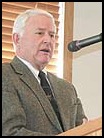
In response to the second lawsuit, Rep. Kay Mciff (an attorney) has now figured out a way to circumvent the courts by introducing yet another bill (HB 68) that limits the "Utah Public Trust Doctrine" to "current enacted laws"; effectively hamstringing this "Public Trust Doctrine". Mciff's intent seems to prevent legal challenges to laws pertaining to the Public Trust Doctrine even if those laws appear unconstitutional. Although Mciff's intent appears to be directed at the stream access issue, his new bill could affect future challenges pertaining to other aspects of the Utah Public Trust Doctrine.
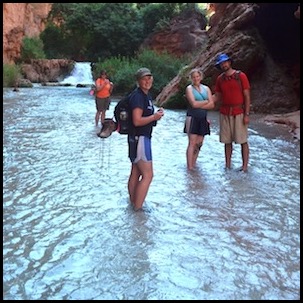
In Utah, whenever the rights of the public appear to conflict with the rights of property owners, the public almost always loses. Utah law appears to negate 150 years of water use law and could even be used as a model for attacking the the right to river access in other states. This is one fight we can't afford to lose. Let your voices be heard by contacting your representatives.
If possible, also attend the rally this coming Tuesday (2/11/14) to help raise public awareness on this issue: Utah Rally For Public Water Access.
- Mike Iverson (updated 2/6/14)
P.S. Here are a few insights and thoughts I had after attending the 2013 rally:
On the positive side, Rep. Mciff acquiesced to the public's input and pulled his bill (HB68), at least until the two legal challenges to his original bill (HB141) are played out in court.
Now for the down side...
After the rally, I waited a couple of hours for a chance to meet with my representative (Gage Froerer) to urge him to consider the "compromise bill" sponsored by Rep. Dixon M. Pitcher which is based on Idaho's access law, a law that has worked well for over thirty years. I was confused by his reaction as he didn't seem interested in anything I had to say about the issue. He even told me that he ALWAYS sides with private land owners in these issues, which indicated to me that his mind was already made up even before he knows what's actually in the bill!
Like I said, I was confused with Rep. Froerer's reaction, at least I was confused until I got home and found a newspaper article about him dating from back in 2009. After reading the article, it became clear that my meeting with him was a total waste of time. He apparently has a major conflict of interest with any bill dealing with stream access. I'll be curious to see if he abstains from voting on the compromise bill if it ever comes up for a vote...
Further reading:
Stream access rally at Utah Capitol on Tuesday - Ogden Standard Examiner - 02/06/2014
Water rights and 2014, HB37 Public Waters Access Act -- Will history repeat itself? Ogden Standard Examiner - 02/05/2014
Fishing access focus of Ogden lawmaker's bill - Ogden Standard Examiner - 01/20/2014
OUR VIEW: Streams belong to taxpayers - Ogden Standard Examiner - 03/15/2010
Utah Stream Access Trouble - Legislature is at it again! - Bryan Gregson Photography - 01/17/2013
USAC action against HB68/HB141 - UtahWildlife.net - 01/30/2013
ANWR: Should we or shouldn't we...
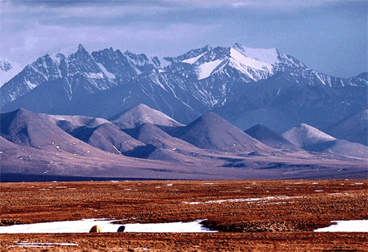
Now I used to think that I was cool
Running around on fossil fuel
Until I saw what I was doing
Was driving down the road to ruin
- James Taylor "Traffic Jam"
I received an email today from a family member who wanted my opinion on the question of oil development in the coast region of the Arctic National Wildlife Refuge (ANWR).

It wasn't easy, but after an exhaustive internet search I finally found a relatively impartial analysis from the Arctic Institute's Center for Circumpolar Security Studies. This article boiled down the debate to one real question: "how much risk is acceptable to produce energy in the High North?"
Here are some talking points from the article:
1. "Currently, the TAPS oil pipeline is nearing the lower limit on throughput and pace of offshore development may be too slow to keep the flow of oil up."
Unless more regional oil reserves are developed, the Alaskan pipeline will not be profitable enough to justify it's own existence. Opening part of ANWR to drilling would provide a short term solution to this.
2."ANWR boasts pristine wilderness, one of the last undeveloped regions in the United States, with a large migratory caribou area."
Are we, as a people, willing to sacrifice what might be the last piece of undeveloped wilderness left the United States? I can't speak for the rest of the country, but I find this to be the most compelling reason to not drill. To quote Joni Mitchell, “you don’t know what you’ve got ’til it’s gone”...
3. "State interests are inexorably connected to production of oil and gas resources in Alaska, with over 85% of state budget attributed to petroleum revenues."
The land in question is held in trust by the Federal Government for all U.S. citizens, this is not just an Alaskan concern. The state of Alaska obviously wants to drill as the vast majority of their money comes from the oil industry. Because of this, I will be skeptical of any information coming from Alaskan politicians who will want to turn this into a “states rights” issue. Obviously, we should also be wary of any information coming from the fossil fuel industry who will spin the debate toward prioritizing short term profits over any long term effects oil development might have on the environment (or even the energy industry itself).
4."As Arctic development increases, and the U.S. establishes its own procedures for accessing resources, Arctic member states will look to U.S. success, or failure, for precedents. The U.S.’ pledge to promote sustainable development will have no leverage should the United States irreversibly damage the Alaskan environment."
Drilling could prove to be counterproductive to our foreign policy. The U.S. is trying to establish it’s position as a world leader in “green” technology, and is therefore actively trying to convince counties (China, Russia, etc.) to become more environmentally responsible. Does drilling ANWR make us appear to be hypocrites?
So what do I think? Both sides of this debate have merit and the final decision is one we cannot afford to jump into hastily. This isn't a one issue problem; environmental, economic, and foreign policy considerations must be carefully studied and weighed, one against the other, before moving forward with any new federal policy.
From a political standpoint, development of the ANWR oil reserves may be unavoidable, but we must make sure the process is done with sufficient regulation to avoid damaging the ANWR ecology or our global standing as a leader in environmental responsibility; we can't afford another Exxon Valdez…
Mike Iverson
Recommended reading…
My Turn: DNR's Unfortunate Mission Change
Will Drilling ANWR Ease The Oil Crisis?
How many of us actually "celebrate" Labor Day?

It is we who plowed the prairies; built the cities where they trade;
Dug the mines and built the workshops, endless miles of railroad laid;
Now we stand outcast and starving midst the wonders we have made;
But the union makes us strong.
- Solidarity Forever by Ralph Chaplin
I've been spending so much time working on my progressive clawhammer project that I almost forgot to write something about Labor Day! I would be neglecting my "folksinger's perspective" on things if I let this day slip by without mentioning it...
I may be mistaken, but I believe that few of us actually think about "labor" on the one day set aside each year to celebrate all that we, as a society, have gained from the labor movement during the last hundred years or so. As a child, I remember asking my mother what, exactly, it was that we were supposed to be celebrating; I ended up more confused than before I asked the question!
Not only have we apparently forgotten that Labor Day is all about celebrating unions, we eventually managed to kill off the parades and public events that used to be a part of this holiday. How did this happen? I'm pretty sure it was a calculated act designed to slowly erase this holiday's "union" origins, the idea of which so many find to be uncomfortable, if not down right threatening. Eliminate the parades and festivities and you effectively “pull the plug” on labor unions involvement in the national holiday created in honor of them; a pretty effective plan!
Have we forgotten just how bad things were before unions? It sometimes seems so. One good example can be found in the area of child labor. Pete Seeger, in his book Carry It On, quotes the following from Mother Jones' autobiography:
"At five-thirty in the morning, long lines of little gray children came out of the early dawn into the factories, into the maddening noise, the lint filled rooms. Outside the birds sang. At lunch half-hour, the children would fall to sleep over their lunch of cornbread and fat pork. They would lie on the bare floor and sleep. Sleep was their only recreation, their release, as play is to a free child. Often the little ones were afraid to go home alone at night. Then they would sleep on the floor."
Pete also gives an example of just how far the owners of these factories would go to justify their exploitation of children:
“They seem to be always cheerful and alert, taking pleasure in the light play of their muscles; enjoying the mobility natural to their age. The work of these lively elves seemed to resemble a sport in which habit gave them a pleasing dexterity.” - Textile employer, circa 1900
For those who think the fight for workers rights is a thing of the past, it is amazing just how quickly the gains of the last century and a half can be stripped away. Just look what happened in Wisconsin earlier this year. This is only the beginning of the war. Soon others will follow Wisconsin's lead. I know this to be true as it's already happening in my own community...
Just a few months ago members of the Ogden City School Board stripped teachers of their right to collective bargaining. Not only was the right to union representation taken away from these educators, the school board then issued an ultimatum demanding that teachers sign an non-negotiated contract or face immediate termination.
Unbelievable as it may sound, this same School Board recently appointed one of their own members (one of the architects of the draconian anti-union policy) as the new Ogden City School District Superintendent; an individual with no prior experience in education or administration. Without union representation, who is there left to protect the rights of the teachers? The voters? I'm hoping they can set aside their apathy long enough to vote out the entire School Board in the next elections.
"The best argument against democracy is a five-minute conversation with the average voter." - Winston Churchill
"People of the same trade seldom meet together, even for merriment and diversion, but the conversation ends in a conspiracy against the public...” - Adam Smith
Solidarity Forever...
Mike
9/7/11 Update:
Two days after posting this blog entry, the Ogden School District made the front page (again) of the Ogden Standard Examiner. I appears that the American Federation Of Teachers is questioning the legality of Brad Smith’s appointment to the position of District Superintendent. The article raised a number questions regarding the legality of this appointment, but the most compelling argument seems to revolve around a requirement that job openings be publicly posted unless hiring an existing district employee. The OSD claims that Smith was already an employee of the district, but if this were the case, wouldn’t this prevent his serving on the School Board based on a conflict of interest?
To answer this question, I did a quick internet search for criteria that would make a candidate ineligible to seek a position on a School Board. I found that most (if not all) states have stringent rules stating that those seeking a seat on the School Board not be employed by either the district or the board (or be related to said employees). I can’t imagine a district teacher being allowed to serve on the board, so why should any other district employee be allowed to do so? The Ogden School District appears to be stating that Smith was eligible to serve on the School Board and, at the same time, was also an employee. You can’t have it both ways:

Kudos to the AFT! They are the only union with the backbone to stand up and fight for those who, in turn, have sacrificed so much to teach our children...
9/10/11 Update:
It’s amazing how quickly the “bullies” back down when their victims actually fight back! I just found out that the Ogden School Board has backed down on their “no collective bargaining” stance. Thanks to all who have helped, especially the AFT.
No thanks go out to the Ogden Standard Examiner who chose to ignore the news about the restoration of collective bargaining rights after previously editorializing in support of Smith (I had to hear the news from friends working for the school district).
In defense of the Standard, they haven’t completeIy stopped coverage of this issue. I read in today’s paper that the State School Board has granted a waiver to Brad Smith to allow him to carry on as superintendent, but added that any legal questions concerning his hiring will have to be resolved by the courts. That same issue also carried a story explaining that the State School Board has drafted plans to streamline the firing of teachers by the districts; the wording is suspect as it may lead to teachers being let go for reasons other than performance. Is the State School Board following the lead of the Ogden City School Board? If so, this is not a good sign of things to come...